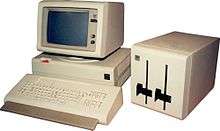IBM Displaywriter System

The IBM Displaywriter System 6580 was a dedicated microcomputer-based word processing machine that IBM's Office Products Division introduced in June 1980.[1][2] The system consisted of a central processing unit, based on the Intel 8086, in a desktop case, a monochrome CRT monitor atop the CPU, a detached keyboard, a detached dual disk drive that used 8-inch floppy disks, and a detached daisy wheel printer. The system booted from an 8-inch floppy disk that stored IBM's internally developed word processing software. The operator stored the "documents" (i.e., data files) on additional diskettes.
"A basic system — consisting of a display with a typewriter-like keyboard and a logic unit, a printer and a device to record and read diskettes capable of storing more than 100 pages of average text — cost $7,895 and leased for $275 a month."[1] The basic word-processing software was Textpack E, with simple mail merge; Textpack 2 added support for double-sided disks, networking, spellchecking, and print spooling; Textpack 4 added automatic hyphenation, columns, and more sophisticated merging; and Textpack 6 added automatic footnoting and outlining. Other options included multilingual dictionaries, graphics, and reports.[3]
The Displaywriter's features were comparable to other dedicated word processing machines of its era. The features included mail-merge, with fields designated as a01, a02, a03, etc. Elementary arithmetic could be applied to the fields.
The basic IBM Displaywriter was a standalone system. An optional central storage and management unit was available, which permitted multiple Displaywriters to share storage and a printer.
UCSD p-System[4][3] operating system and CP/M-86[5][6] were available for the Displaywriter System but were not its regular Operating System.
Connections to other IBM systems included:
- IBM 3278 emulation program[3] to attach to IBM 3274/3276 controllers, IBM 4321/4331, or IBM 4701.
- IBM 3277 emulation program to attach to IBM 3271, 3272 or 3274 controllers.
- Connection to IBM 8100 systems which use DPCX/DOSF.
Because of Displaywriter's popularity, IBM later produced DisplayWrite software for the IBM Personal Computer, with a similar user interface and equivalent to Textpack 4.[2]
References
- 1 2 "IBM Displaywriter". IBM Archive. Retrieved 2009-01-31.
- 1 2 Dickinson, John (1984-09-18). "IBM's Displaywriter Begets a Family of PC Software". PC. p. 238. Retrieved 29 January 2015.
- 1 2 3 Dickinson, John (1984-09-18). "The Prototype: Displaywriter". PC Magazine. pp. 242–243. Retrieved 9 March 2016.
- ↑ SofTech's new products extend p-System's versatility. Info World. Retrieved 2010-02-25.
- ↑ Digital Research (1981). CP/M-86 IBM displaywriter reference manual.
- ↑ Libes, Sol (December 1981). "Bytelines". BYTE. pp. 314–318. Retrieved 29 January 2015.
External links
 Media related to IBM Displaywriter System at Wikimedia Commons
Media related to IBM Displaywriter System at Wikimedia Commons